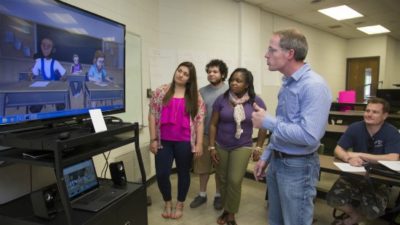Simulations are a powerful tool for teacher education
Sean is a little too eager to please his middle-school teacher; he interrupts frequently and always has something to say about everything, relevant to the lesson or not. Maria, by contrast, is shy and withdrawn; she needs her teacher to draw her out into participation. And CJ is totally absorbed by her cell phone.
They, and their classmates Ed and Kevin, seem so real.
But they’re not. They are computer-simulation avatars, whose words and actions are generated by professional actors at a remote location. These five students are the key players in TLE TeachLive™, a simulation designed for teacher training. The School of Education at the University of Missouri-Kansas City brought in TeachLive, developed by the University of Central Florida, as a new tool this semester, making UMKC one of only 42 schools of education in the country to put this cutting-edge technology to work.
Real-life student teaching in real classrooms remains a foundational element of teacher education at UMKC. But TeachLive offers some unique advantages, according to Dr. Patty Alvarez McHatton, associate dean for teacher education.
Teaching simulations last approximately 8 minutes, and are designed to present participating teacher candidates with specific situations and challenges they might have to wait weeks to encounter in a real-world classroom. Each “student” in the virtual class comes with a distinct personality and complete backstory, including a range of cultural influences and socioeconomic factors as well as personal histories. The actors receive two lesson plans before each session: the lesson plan the teacher candidate wants to use with the avatar students; and the one the college professor has in store for the teacher candidates.
The simulation also can be paused, allowing the professor to offer input to the teacher candidate, or permit class discussion among the college students in the class. TeachLive simulations also allow teacher candidates to make mistakes, and learn from them, without real students suffering any consequences.
The technology is so promising that longtime School of Education benefactor Bert Berkley donated $25,000 to fund a pilot program for TeachLive at UMKC. Alvarez McHatton is introducing the technology to the school this semester in her “Education of the Exceptional Child and Youth” class. The system is also being used in the “Teaching and Learning with Technology” class taught by instructor Erdem Demiroz.
Berkley, School of Education interim dean Chris Brown, and several educational and community leaders sat in on a demonstration of TeachLive recently at UMKC.
The system is quite versatile. In addition to the middle-school scenario described above, the same five students can be “advanced” to high-school-age versions of themselves. Their quirks and challenges can be dialed up or scaled back. Different students with special needs, such as various degrees of autism, can be subbed in. Teacher candidates can even engage in parent-teacher conference simulations with the adult avatar.
And it is a live interaction in real time with the actors running the avatars. During the demonstration, one student made a reference to violent riots in the city of Baltimore that had occurred the day before.
“It’s a double-loop learning,” Alvarez McHatton explained. “The person interacting with the (virtual) kids is learning, but so are the students watching the interaction. If things aren’t going the way you’d hoped, you have the opportunity to stop the simulation and seek input and feedback from your peers, and re-enter the simulation armed with new strategies.”
For example, one teacher candidate used the word “red flag” to describe a student’s behaviors in a parent-teacher conference, then referred to the need for an “intervention.” The “parent” had a strong negative reaction to those words, so Alvarez McHatton paused the simulation and suggested different wording: “I want to find out what each child in the class needs help with, and then work with you (the parent) to address those needs.”
TeachLive accelerates learning for the teacher candidates, Alvarez McHatton said. “The research shows that as few as four or five 8-minute sessions are enough to change teacher behavior,” she said.

